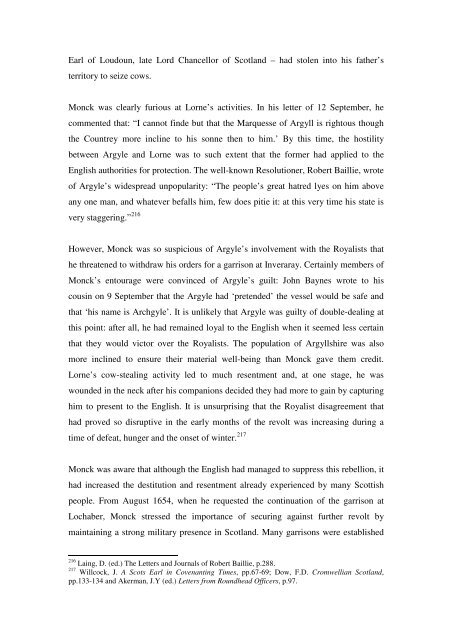The Glencairn Uprising, 1653-54 Helen Baker Department of ...
The Glencairn Uprising, 1653-54 Helen Baker Department of ...
The Glencairn Uprising, 1653-54 Helen Baker Department of ...
You also want an ePaper? Increase the reach of your titles
YUMPU automatically turns print PDFs into web optimized ePapers that Google loves.
Earl <strong>of</strong> Loudoun, late Lord Chancellor <strong>of</strong> Scotland – had stolen into his father’s<br />
territory to seize cows.<br />
Monck was clearly furious at Lorne’s activities. In his letter <strong>of</strong> 12 September, he<br />
commented that: “I cannot finde but that the Marquesse <strong>of</strong> Argyll is rightous though<br />
the Countrey more incline to his sonne then to him.’ By this time, the hostility<br />
between Argyle and Lorne was to such extent that the former had applied to the<br />
English authorities for protection. <strong>The</strong> well-known Resolutioner, Robert Baillie, wrote<br />
<strong>of</strong> Argyle’s widespread unpopularity: “<strong>The</strong> people’s great hatred lyes on him above<br />
any one man, and whatever befalls him, few does pitie it: at this very time his state is<br />
very staggering.” 216<br />
However, Monck was so suspicious <strong>of</strong> Argyle’s involvement with the Royalists that<br />
he threatened to withdraw his orders for a garrison at Inveraray. Certainly members <strong>of</strong><br />
Monck’s entourage were convinced <strong>of</strong> Argyle’s guilt: John Baynes wrote to his<br />
cousin on 9 September that the Argyle had ‘pretended’ the vessel would be safe and<br />
that ‘his name is Archgyle’. It is unlikely that Argyle was guilty <strong>of</strong> double-dealing at<br />
this point: after all, he had remained loyal to the English when it seemed less certain<br />
that they would victor over the Royalists. <strong>The</strong> population <strong>of</strong> Argyllshire was also<br />
more inclined to ensure their material well-being than Monck gave them credit.<br />
Lorne’s cow-stealing activity led to much resentment and, at one stage, he was<br />
wounded in the neck after his companions decided they had more to gain by capturing<br />
him to present to the English. It is unsurprising that the Royalist disagreement that<br />
had proved so disruptive in the early months <strong>of</strong> the revolt was increasing during a<br />
time <strong>of</strong> defeat, hunger and the onset <strong>of</strong> winter. 217<br />
Monck was aware that although the English had managed to suppress this rebellion, it<br />
had increased the destitution and resentment already experienced by many Scottish<br />
people. From August 16<strong>54</strong>, when he requested the continuation <strong>of</strong> the garrison at<br />
Lochaber, Monck stressed the importance <strong>of</strong> securing against further revolt by<br />
maintaining a strong military presence in Scotland. Many garrisons were established<br />
216 Laing, D. (ed.) <strong>The</strong> Letters and Journals <strong>of</strong> Robert Baillie, p.288.<br />
217 Willcock, J. A Scots Earl in Covenanting Times, pp.67-69; Dow, F.D. Cromwellian Scotland,<br />
pp.133-134 and Akerman, J.Y (ed.) Letters from Roundhead Officers, p.97.
















